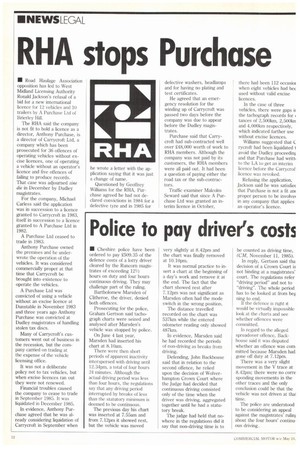Police to pay driver's costs
Page 12

If you've noticed an error in this article please click here to report it so we can fix it.
• Cheshire police have been ordered to pay £509.35 of the defence costs of a lorry driver cleared by the Runcorn magistrates of exceeding 121/2 hours on duty and four hours continuous driving. They may challenge part of the ruling.
Bartholomew Marsden of Clitheroe, the driver, denied both offences.
Prosecuting for the police, Graham Gertson said tachograph charts were seized and analysed after Marsden's vehicle was stopped by police.
On June 4 last year, Marsden had inserted his chart at 8.10am.
There were then short periods of apparent inactivity interspersed with driving until 12.34pm, a total of four hours 24 minutes. Although the actual driving period was less than four hours, the regulations say that any driving period interrupted by breaks of less than the statutory minimum is deemed to be continuous.
The previous day his chart was inserted at 7.55am and from 7.12pm it showed rest, but the vehicle was moved very slightly at 8.42pm and the chart was finally removed at 10.10pm.
It was normal practice to insert a chart at the beginning of a day's work and remove it at the end. The fact that the chart showed rest after 7.12pm was not significant as Marsden often had the mode switch in the wrong position.
The distance travelled recorded on the chart was 537km while the entered odometer reading only showed 487km.
In evidence, Marsden said he had recorded the periods of non-driving as breaks from driving.
Defending, John Backhouse said that in relation to the second offence, he relied upon the decision of Wolverhampton Crown Court where the Judge had decided that continuous driving consisted only of the time when the driver was driving, aggregated together until he had a statutory break.
The judge had held that nowhere in the regulations did it say that non-driving time is to
be counted as driving time, (CM, November 11, 1985).
In reply, Gertson said tha decision of a Crown Court is not binding at a magistrates' court. The regulations refer "driving period" and not to "driving". The whole period has to be looked at from be ning to end.
It the defence is right it would be virtually impossible look at the charts and see whether offences were committed.
In regard to the alleged spreadover offence, Backhouse said it was disputed whether an offence was committed because Marsden had gone off duty at 7.12pm.
There was a very slight movement in the V trace at 8.42pm; there were no corre sponding movements in the other traces and the only conclusion could be that the vehicle was not driven at thai time.
'rhe police are understood to be considering an appeal against the magistrates' rulini about the four hours' continuous driving.














































































